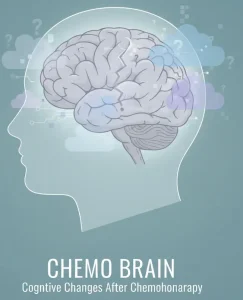Overview
Diagnosis
There are no specific tests to diagnose chemo brain. People with cancer who experience symptoms of chemo brain often perform within typical ranges on memory or cognitive tests.
A healthcare professional makes a diagnosis based on your symptoms and medical history. To rule out other possible causes of your symptoms, your healthcare professional may recommend:
-
Blood tests to check for anemia, thyroid issues, or vitamin deficiencies.
-
Brain scans such as MRI or CT scans to look for structural changes.
-
Other diagnostic tests to exclude conditions like depression, sleep disorders, or medication side effects.
Treatment
Treatment for chemo brain focuses on coping strategies and symptom management. For many people, memory and thinking problems improve over time as the body recovers from cancer treatment. Your healthcare team can help identify practical ways to manage the condition.
Managing Conditions That Worsen Memory Troubles
Cancer and its treatments may cause or worsen other health issues that affect memory and concentration, such as:
-
Anemia
-
Depression
-
Sleep disturbances
-
Early menopause
Managing these underlying conditions can help ease the effects of chemo brain and improve cognitive function.
Managing Chemo Brain Symptoms
Treatment often includes cognitive rehabilitation (also called cognitive remediation), guided by a neuropsychologist — a specialist in brain function and memory.
Ways to cope include:
-
Brain-training exercises: Practice memory and thinking activities to help rebuild cognitive connections.
-
Tracking memory issues: Notice when symptoms worsen — for example, when tired, hungry, or stressed — to plan demanding tasks for times when you feel most alert.
-
Adapting your routine: Use strategies like note-taking, outlining key points, or using reminders. Therapists can teach communication techniques to help you recall information better.
-
Relieving stress: Stress can worsen memory problems. Relaxation techniques such as progressive muscle relaxation or mindfulness (focusing on sights, sounds, or smells around you) may help reduce stress and improve clarity.
Medicines
Currently, there are no medications specifically approved to treat chemo brain. However, some medicines approved for other conditions may be used under medical supervision to help with symptoms.
Commonly used options include:
-
Methylphenidate (Concerta, Ritalin, others): Typically used to treat ADHD.
-
Donepezil (Aricept, Adlarity): Commonly used for Alzheimer’s disease.
-
Modafinil (Provigil): Used to manage certain sleep disorders.
-
Memantine (Namenda): Also used for Alzheimer’s disease and sometimes prescribed for patients receiving radiation therapy to the brain.
Advertisement

